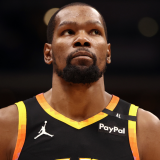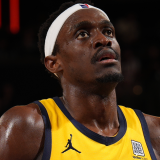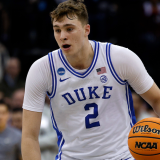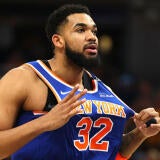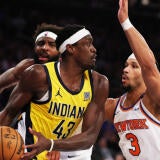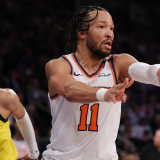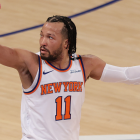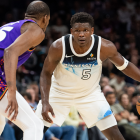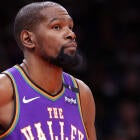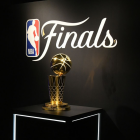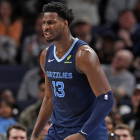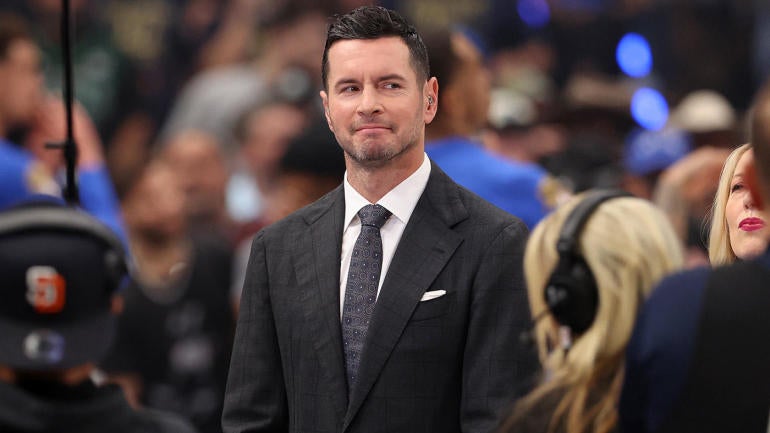
JJ Redick hasn't publicly commented on the state of the Los Angeles Lakers as he has interviewed for their head-coaching job. During the search that led up to the hire of Darvin Ham in 2022, though, he had plenty to say. "Until they start building their team like every other team in the NBA does, in the modern NBA, I don't think this is a good job," he said on a 2022 appearance on ESPN's Get Up.
The roster that the Lakers have built since then is much closer to league standard than it was in 2022. Russell Westbrook is gone. There's more shooting even if there isn't enough of it. Every position is addressed at least somewhat. On paper, the Lakers at least somewhat resemble a normal NBA team. The Detroit Pistons do not. Their two best players, Cade Cunningham and Jaden Ivey, are both point guards. The fringes of the roster were populated largely by draft busts from other teams like Kevin Knox, James Wiseman and Marvin Bagley. None of their players ranked in the top 90 in the NBA in made 3-pointers. They had too many centers and no true wings.
There is a world in which the right coach could take over the Lakers and lead them to 50 wins with the right tweaks. That isn't happening for the Pistons, at least not yet. They are still relatively early into a rebuild that isn't far away from getting expensive. Cunningham is eligible for a rookie extension this offseason. Ivey and Jalen Duren will be eligible next summer. There are going to have to be hard decisions about who stays and who goes here. At the very least, the Pistons need a reshuffle to diversify the skill sets of their core players. At most, they may eventually need to acknowledge that Cunningham is the only cornerstone piece they have and re-evaluate their attachment to anyone else. If Redick's goal is to win right now, the Lakers are a better bet for him.
It should therefore come as no surprise, then, to hear that, at least for the moment, the basketball world seems to expect Redick to land in Los Angeles, not Detroit. " Redick is currently a prime candidate for the Lakers job, so it isn't known how much traction Detroit could actually gain," Yahoo's Vincent Goodwill reported. If Redick is at the finish line with the Lakers, he may not even hear the Pistons out.
But there are meaningful connections here. Pistons vice chairman Arn Tellem was once Redick's agent. President of basketball operations Trajan Langdon worked in the Pelicans front office that signed Redick as a free agent in 2019. Both are Duke alums known for their 3-point shot. He may not have hosted a podcast with any current members of the Pistons organization, but there's a viable infrastructure waiting for him in Detroit if he wants to pursue it. Even if he does, there's no guarantee he'd get the job. This isn't exactly a binary choice. He's spent weeks pitching himself to one team. The other is only one day into searching for its own coach. But if the Pistons are seriously interested, it's a job Redick should pursue. Detroit is a better fit for him than Los Angeles.
Concerns over Detroit's roster are valid. The Pistons are a fixer-upper. It's going to take time for them to get it right. Time is something the Lakers don't have. LeBron James is about to turn 40, after all, and Anthony Davis is 31 with an extensive injury history. They are a Play-In team whose trajectory in a loaded Western Conference is pointing down. They could try to trade as many as three first-round picks and three first-round swaps this offseason to change that, but even that would be a relatively short-term play given how old their two other stars currently are. Maybe there's an aggressive one- or two-year title push to be made here, but would that be worthwhile if it cost the Lakers control of their next handful of drafts?
The short answer is probably no, but where exactly does that leave Redick? The roster doesn't have time, but the Lakers rarely afford it to their head coaches anyway. Whoever they hire to replace Ham will be their seventh full-time head coach since Phil Jackson retired in 2011. They fired Frank Vogel two years after a championship and Ham one year after reaching the Western Conference finals. If the Lakers go all-in to win now, they entrust their immediate fate to a coach with no experience. If they don't, they likely continue on their more gradual decline toward the bottom of the West. Given the relatively brief tenures most Laker coaches can expect, neither situation sounds ideal for Redick.
And then of course, there is the subtext of that 2022 quote about the Lakers job. The Lakers roster might look a bit more like what most teams are fielding two years later, but the path they took to build it was anything but. Redick called on them to act like teams do in the modern NBA back in 2022. There is nothing modern about the family business structure this organization still takes.
The Lakers simultaneously have a front office that is too big and too small. They aren't exactly known for employing a deep support staff or investing in scouting or analytics at the level that other teams do. What they do have is too many cooks in the kitchen. Rob Pelinka nominally controls all basketball decisions. At various points over the past several years, reports have either stated or hinted at influence from a variety of other sources, some more qualified than others. It's never quite clear if a Lakers decision is being made by Pelinka or Kurt Rambis. Or Linda Rambis. Or Tim Harris. Joey and Jesse Buss have developed a strong resume over the last few years and have earned voices as well.
Taking the Laker job means playing the Game of Thrones. Navigating palace intrigue shouldn't be such an important part of a first-time coach's job. The ideal team structure for any coach, much less one without experience, is a wealthy but hands-off owner that defers to a strong, singular head of basketball operations who in turn entrusts on-court matters fully to the coach. The Lakers thing Redick needs is for Kurt Rambis to push him for more DeAndre Jordan and Dwight Howard minutes.
This front office outlasted Luke Walton. It hired and fired both Vogel and Ham. If nothing else, the Laker front office has a penchant for self-preservation. They have the advantage of Laker ties Redick lacks. If push comes to shove, would Jeanie Buss back him over Kobe Bryant's former agent Pelinka, or a member of the Showtime Lakers in Rambis? History has thus far indicated that the answer is no.
In Los Angeles, coaches have been disposable. The front office's inner circle has not been. That's how Frank Vogel winds up getting scapegoated for a trade that Pelinka made and James endorsed. Vogel had a championship ring to his name when he lost his job. It's hard to imagine that Redick will if this thing goes south after a few years. Without a strong resume as an assistant, prospective future employers only have the Lakers' tenure to judge him off of. If it goes badly enough, that might be enough to kill a promising coaching career before it really starts.
Maybe Redick can handle all of the extra nonsense that comes with coaching the Lakers. Maybe he can't. It's too early to tell. But if he can find a team that operates a bit more like everybody else does, well, that's probably a path worth considering.
Ironically, that really hasn't been the Pistons lately. They've been just as guilty as the Lakers of having too many cooks in the kitchen. Tellem seemingly has influence over basketball matters. Former general manager Troy Weaver was theoretically the shot-caller. Monty Williams surely negotiated some measure of front office say when he convinced the Pistons to give him a historic contract. Job security in Detroit is fair to question as well. Williams just got fired after one year, though in fairness, Dwane Casey and Stan Van Gundy reigned for nine combined years before him.
But that decision highlights two key advantages the Pistons offer over the Lakers. The first is financial. The Lakers, by all rights, should be able to spend far more on coaches than the Pistons do. Yet when the Lakers pursued Dan Hurley, they offered him a six-year, $78.5 million pact that was worth less than what Detroit paid Williams. Now, the Pistons are paying Williams to go away. That's a rare financial commitment, but it's one Tom Gores can afford to make. Forbes estimates that he has a $9.1 billion net worth. The finances of the Laker owners are far more complicated. The Buss family does not have another major source of wealth. Their money comes primarily from the Lakers, and six siblings each own a share of a stake once held by Dr. Jerry Buss. The Lakers bring in a ton of revenue. They're willing to reinvest it in high-profile ways, like paying the luxury tax and adding stars. But they've never really flexed their financial muscle in the subtler ways that tend to lead to sustained winning. Gores can do that, and he's proving it now.
More importantly, Gores has done what the Lakers practically never have. The first step in solving any problem is admitting that there is one. Gores just fired his head coach and general manager because the way the Pistons operated was fundamentally unsound. Now, he's empowered a new head of basketball operations, hoping to fix that. Just as it's too early to draw any reasonable conclusions about Redick, it is about Langdon as well. But at least the Pistons seemed to understand that change was needed.
The Lakers have not, and it's pretty concerning when you consider how the past decade or so has played out. They had the worst record in the NBA in the five years between Bryant tearing his Achilles and James moving out West. They won a single championship largely because James chose to play for them, a decision that was probably based on far more than his belief in the team's on-court prospects, and they have proceeded to mismanage their roster completely in the four years since. At no point has there been substantive reporting suggesting that any key member of the front office that traded for Westbrook or kept hiring the wrong coaches or offered Dennis Schroder $84 million mere months before he signed for less than 10% of them has been in any real danger. The Lakers have never really acknowledged just how far behind the times they really are.
The rosters matter here, but only to a point. One offers the chance to win for a year or two before things likely get worse. The other demands a year or two of losing before things probably get better. Ultimately that's a matter of preference. Some coaches are genuinely better fits for one than the other. A coach with no experience is probably better suited to the "lose now, win later" path just because that early losing is an opportunity to learn on the job, but again, there are arguments on both sides.
But the most important part of building the sort of sustained winner Redick surely wants is stability, and the Laker circus just doesn't offer much of it. There are suitable ringleaders for it out there, coaches with enough seasoning to know what to expect out of it. One day, that might be Redick. For now, he's better off starting his coaching career in a more typical environment. That might mean Detroit now or it might mean another team later. It might cost him a few early wins, but it's the best move for his coaching future.
![[object Object] Logo](https://sportshub.cbsistatic.com/i/2020/04/22/e9ceb731-8b3f-4c60-98fe-090ab66a2997/screen-shot-2020-04-22-at-11-04-56-am.png)


